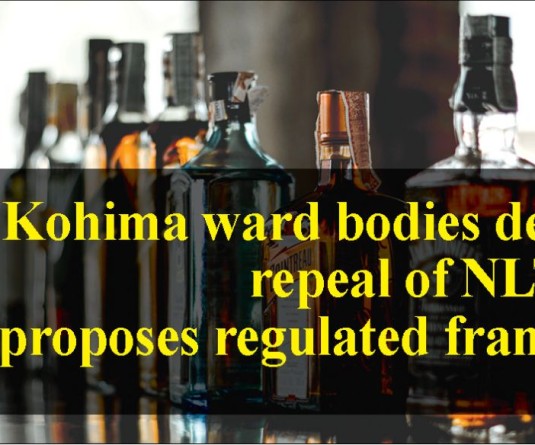Nagaland Dy CM TR Zeliang addressing the 22nd Triennial Conference cum 63rd Anniversary celebration of NDBA at Mokokchung on January 17. (Morung Photo)
Morung Express News
Mokokchung | January 17
Nagaland Deputy Chief Minister TR Zeliang has called for the creation of a “Basic Naga Law” (Customary Law) under a three-tier system to preserve and strengthen Naga customary practices. Speaking as the special guest on the second day of the 22nd Triennial Conference and 63rd Anniversary Celebration of the Nagaland Dobashi Association (NDBA) at P. Shilu Park, Mokokchung, Zeliang emphasized the significance of Article 371(A) of the Indian Constitution, which grants special provisions to Nagaland.
He reiterated that under Article 371(A), no act of Parliament concerning Naga customary laws, land, or resources could apply to the state unless approved by the Nagaland Legislative Assembly. Stressing the importance of protecting these rights, Zeliang urged the Dobashis and Gaon Buras (GBs) to understand and defend these constitutional safeguards.
Zeliang proposed a framework for customary law through a three-tier system: the Village Council/GB Court to address local disputes within villages, the District DB Court to handle cases that require escalation beyond the village level, and the DB Apex Court, which would act as the highest authority for customary adjudication, akin to a Supreme Court within the Dobashi system.
He suggested that the NDBA form Research Committees to collect and document tribal customary laws from every tribe. These laws could then be unified into a draft Basic Naga Customary Law, which could be tabled in the Legislative Assembly for discussion and potential enactment.
Zeliang reiterated the importance of transparency in Dobashi judgments, stating that unbiased rulings would ensure credibility and prevent interference from higher courts. He also advocated for strengthening the Village Council and Area Council Act of 1978 to fortify Naga customary practices.
Drawing attention to challenges in infrastructure development, Zeliang, who also holds the National Highway portfolio, noted that issues often arise when land compensation agreements are violated by villagers after projects are finalized. He emphasized the need for legal measures to prevent such conflicts, highlighting how the proposed system could effectively mitigate such disputes.
Zeliang lauded the Dobashis and GBs as the backbone of Nagaland’s governance and administration. He praised the NDBA for maintaining unity despite divisions in other apex organizations and acknowledged the contributions of the outgoing NDBA team. Congratulating the new team, he urged them to preserve the Naga customary system and fulfill their roles with integrity.
Chieftain KS Anden Konyak, Commissioner of Nagaland, emphasized the pivotal role of Dobashis as key agents of civil administration, interpreting local laws and customs, and delivering landmark judgments often upheld by higher courts. He urged Dobashis to take pride in their legacy and responsibilities, symbolized by their red vests, which reflect the trust placed in them by the government and the people.
Konyak announced the government’s active consideration of proposals to amend service rules, fill vacant posts, and revise the 1937 Act on justice and police administration to grant Dobashis greater legal authority. He called on them to uphold fairness, integrity, and impartiality, and to serve society with purpose and dedication as role models and agents of change.
The session also included speeches by the Vice President of the Nagaland GB Federation and the General Secretary of Ao Senden. Cultural performances were presented by the Mon District Dobashis and Watsu Mungdang.




